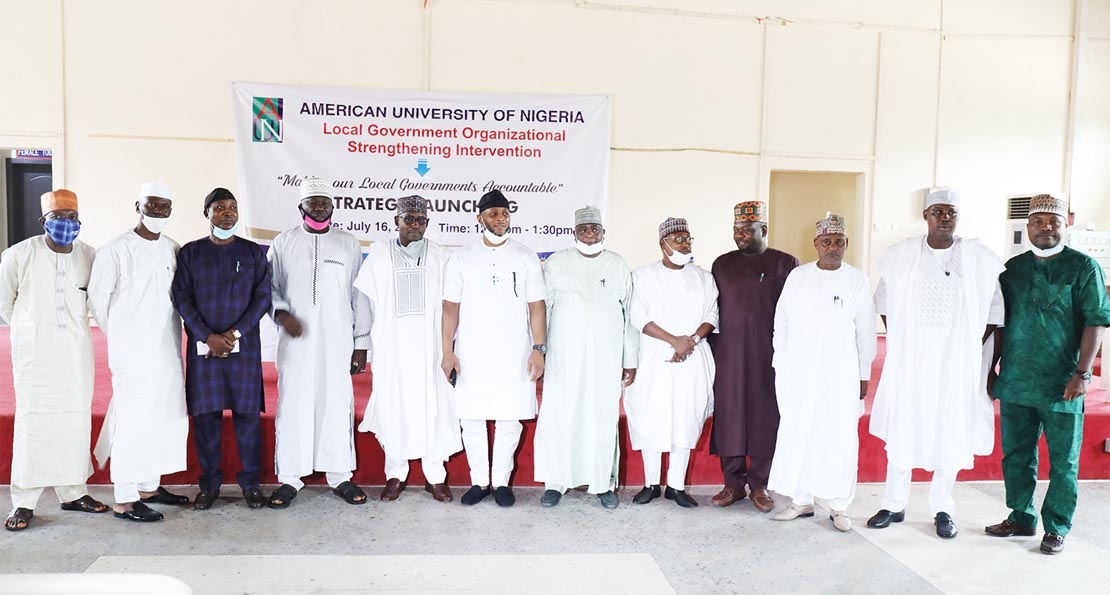Making local governments accountable to the people, the Atiku Center’s Governance Strengthening Intervention has designed a road map for socio-economic development, using credible evidence- based research to achieve social impact.
Local governments (LG) in Nigeria are the level of government closest to the people. From primary and adult education to public health, town planning, roads & transport and waste disposal, this tier of government is saddled with quite a lot of responsibility. However, paucity of funds, and inefficient methods have bewildered LG administration for years.
The American University of Nigeria (AUN) is keen on changing the way local government councils in Nigeria work. The first stop on this arduous journey is the Yola North Local Government Area. Vice President For University Relations, Dr. Abubakar Abba Tahir believes it would be foolhardy to embark on such a grand adventure without impacting on AUN’s host community first.
“The AUN management is proud to join the Atiku Centre in launching a new initiative, which is missioned to support our local communities in all 21 LGAs. Our learning community is excited to join this celebration as a major stakeholder in the strategic development of our host communities.” Said Dr. Tahir who represented President Dawn Dekle at the official signing of a Memorandum of Understanding between AUN and the Yola North LGA.
Half the Adamawa state cabinet, university dons, and a wide range of professionals thronged the North Campus venue, midday on Thursday, 16th of July 2020 for the historic commemoration. Of course, social distancing and other COVID-19 prevention techniques were deployed to ensure the safety of the 40 guests at the event.
The Organizational Strengthening Intervention for Yola North LGA is the brainchild of Dr. Audu Liman (Chief of Party) & the Atiku Center for Development (AUN’s humanitarian arm).
Dr. Hassan Yusuf, an AUN Business Administration & Marketing expert recalled how the Federal Government's recent LGA financial autonomy initiative spurred the Atiku Center into action.
“ The Atiku Center for Development immediately saw a strategic window of opportunity to make LGAs accountable to the people”.
With his characteristic vivacious demeanor and enthusiastic oratory, Dr. Yusuf transported guests to his classroom. “This intervention will ultimately stimulate the evolution of a learning organization. A learning organization looks at every problem as an opportunity to identify root causes and develop countermeasures. With a method tagged “the five whys”, Dr. Yusuf drew a picture of a hypothetical problem.
It goes like this:
There is a puddle of oil on the floor - Clean up the puddle.
And it stops there. This is the way in most organizations. Whereas, in a learning organization, the 5 whys kick in.
- WHY is there a puddle of oil on the floor?
Because the machine is leaking oil. —– Fix the machine.
- WHY is the machine leaking oil? Because the gasket has deteriorated. —– Replace the gasket.
- WHY has the gasket deteriorated? Because we bought inferior gaskets. —– Order different gaskets next time.
- WHY did we buy those gaskets? Because we got a good price on them. —– Change the purchasing guidelines.
- WHY did we choose gaskets based on price rather than quality? Because we evaluate purchasing agents based on short-term cost savings. —– Change our evaluation criteria.
Dr. Hassan’s presentation received resounding applause as the audience appreciated the real-life simulation of problem-solving techniques.
The Atiku Center’s Governance Strengthening Intervention seeks to develop a participatory road map for accelerated socio-economic development, usher evidence-based actions to enhance social impact, and deepen social accountability.
Adamawa state like many others in Nigeria is burdened by over-dependency on monetary allocations from the federal government. This means that not much can be done without aid. This new intervention will reverse the trend by improving revenue generation and resource deployment and also help reinvigorate the local council as a center for inclusive development.
The project will employ institutional analysis and political economy analysis among other models to explain how change arises as a result of the interaction between structures, institutions, and other social agents. Indeed, by this MOU, AUN announces a new dawn for governance at the grassroots, a novel governance strengthening intervention to make sure the people of Adamawa benefit from the level of government closest to them.
By Office of Communications


